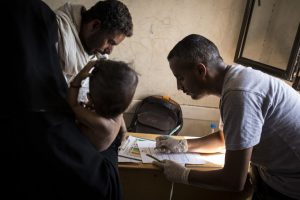The statistics about the dire situation in Yemen are overwhelming. After nearly six years of conflict, 13.5 million people don’t have enough food to eat. 24 million Yemenis – 80% of the country’s population – need humanitarian aid.
And, perhaps most devastating among these figures: one in five children in Yemen suffer from acute malnutrition, the deadliest form of hunger.
These numbers paint broad strokes of the world’s worst humanitarian crisis. But – too often forgotten in headlines and in tweets – the numbers represent real people who are struggling to survive and real families who have their own stories to tell.
As part of our response in Yemen, Action Against Hunger provides emergency cash transfers to thousands of these families to help them survive. Recently, I was welcomed into one of their homes, where they shared a little of what life is like.
Along with Waleed, our driver, and Adel, our Food Security and Livelihoods Program Supervisor, I traveled the dusty roads to Qaddah village, along Yemen’s western coast. We arrived and were met by Ali, the local school principal and well-respected community leader who helps our teams identify and reach families in the village. He took us to visit with Fatima* and her family.
Fatima took charge as the head of her household last year, after her husband suffered a series of strokes and died. She must provide for six children. Two of her adult sons suffer from severe disabilities, leaving them unable to work.
INSIDE FATIMA’S HOME
The family’s small home is made from the branches of palm trees, which form a loose border around their land but still leave the house exposed to hazards. When we walked in and sat down with Fatima and her children, I didn’t see a kitchen or a bathroom. Their oven is out in the open – posing a real fire hazard. The only equipment I can see to prevent fire is a nearby bucket filled with sand. I worry about what happens if someone does not put out the fire well, and sparks fly against the vulnerable walls.
Fatima puts her head between her hands and recalls with agony the terrible situation of a couple years ago, when this area of Yemen was under constant shelling from the war. They couldn’t even access their fire pit – the family hid under the seats we sit on today. The only food they had to eat was leftover bread, tomatoes, and some potatoes shared within the community.
I don’t ask about the bathroom – it’s a taboo topic. But, like many families in Yemen, I assume they use the open area behind their house, putting them at risk of diseases caused by contaminated water and food. The family sleeps outside, exposed, on thin mattresses where mosquitos and other insects buzz, looking for food.
MAKING ENDS MEET
Women in this area of Yemen – even those as strong and independent as Fatima – face challenges as heads of households and it can be hard for them to find a way to earn money. Fatima proudly shows us her wicker basket-making skills – she is determined to make a business out of it. Still, it is not enough.
One of her sons who is able to work, named Sari, is a fisherman. On a good day, he catches ten fish – eight for selling and two to share with his mother, bothers, wife, daughters, nieces, and nephews by the fire. However, starting in October each year, the windy season in Yemen leaves Sari and the other fisherman unable to safely go out to sea and earn an income for six months.
Fatima uses her monthly cash payments from Action Against Hunger to buy the rest of the family’s food at the local market. Two of her granddaughters have suffered from fevers recently, so she will also use some of her monthly money to pay for transportation to one of the free health clinics run by our team.
HOPE IN THE NEXT GENERATION
I try to speak with Fatima’s seven-year-old grandson, Ahmad, but when I ask him about what he has learned in school lately, he is too shy to answer. Then, as we got up to leave, he quietly says how happy he is to be in school and is excited that his grandmother will be able to buy shoes and stationery.
The community school – located next door to Fatima’s home – was expanded by UNICEF and a local partner a couple of years ago. Action Against Hunger provided solar energy and water wells for the school, helping to create a healthy environment for more students.
Ahmad is the only child in the extended family who attends school. Fatima’s children were not able to get an education, so she has big hopes for her grandson’s future.
I visited Fatima and her family for an hour, and I will always remember their home and the kindness they showed me. They will stick with me as I write reports and make our case for how to provide assistance to more families.
I am proud to be part of a lifesaving team that is on the ground 24/7 looking out for the most vulnerable. It is our full responsibility to meet and advocate for those who need our help.
*Names have been changed.


 © Veronique de Viguerie pour Action contre la Faim
© Veronique de Viguerie pour Action contre la Faim